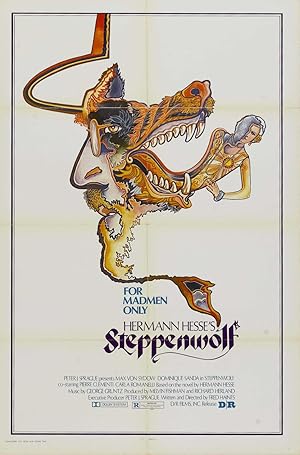
Steppenwolf Page #2
- R
- Year:
- 1974
- 107 min
- 186 Views
violent or objectionable individuals.
For him it'd be just like
starting from scratch...
as "bourgeois", to him, as a state of
being, was an ever present human condition.
Although for him there wasn't anything more
alluring than the equilibrium of the two extremes.
Let's take, for instance, two dualities
like spiritual versus libertine.
Man has the possibility of devoting
himself completely to his spiritual side,
of devoting to a life of
either clergy or sanctity.
On the other hand one can devote one self
to a life of mundane desires and flesh...
...in order to satisfy
one's basic pleasures,
as well as leading a life for the
pursue of lucre and a social position.
One of the two ways leads to sanctity,
to the martyrdom of the spirit, to God
the other way leads to libertinage, to the
martyrdom of the flesh, to corruption.
His ideal is not a meditation but
a conservation of his own self.
The vital force of bourgeoisie
is based on this.
Artists and intellectuals
really liked Harry...
as he knew of all the
pleasures of meditation.
Many artists are of his kind. These persons
all have two souls, two beings within them.
The capacity for happiness and
the capacity for suffering.
Finally, as he was
approaching the age of 47,
a happy and not unhumorous
idea came to him,
as it meant he was
approaching the age of 50.
He started considering the idea of suicide.
In fact this idea became his final motivation.
From that day he decided...
he should get rid of himself, to use that
emergency exit to extinguish his daily suffering.
For some reason something
was wrong with his life
thus his desolation would end with
the negligence of his existence
that'd be the best way to say goodbye
to his pains and sufferings.
He would wait only two years,
then he would accomplish it,
then he started to cherish this idea
it would be the day he turned 50.
This would be the day he would
definitively surrender...
relying on his razor...
he'd take leave of all his pains
and close the door behind.
This way the wolf from the steppes
wouldn't achieve his goal.
Possibly someday he would
learn to know himself better.
Maybe one day he will find
himself in our Magic Theatre...
the very thing that is needed to free his neglected soul.
A thousand such possibilities await him.
Maybe the day will come that he will
see himself reflected in a mirror.
He is aware of the existence of that mirror
in which he has such bitter need to look.
And from which he shrinks
in such deathly fear.
Is it today the performance? Where
Go to the Black Eagle, man,
if that's what you want.
Translation
Translate and read this script in other languages:
Select another language:
- - Select -
- 简体中文 (Chinese - Simplified)
- 繁體中文 (Chinese - Traditional)
- Español (Spanish)
- Esperanto (Esperanto)
- 日本語 (Japanese)
- Português (Portuguese)
- Deutsch (German)
- العربية (Arabic)
- Français (French)
- Русский (Russian)
- ಕನ್ನಡ (Kannada)
- 한국어 (Korean)
- עברית (Hebrew)
- Gaeilge (Irish)
- Українська (Ukrainian)
- اردو (Urdu)
- Magyar (Hungarian)
- मानक हिन्दी (Hindi)
- Indonesia (Indonesian)
- Italiano (Italian)
- தமிழ் (Tamil)
- Türkçe (Turkish)
- తెలుగు (Telugu)
- ภาษาไทย (Thai)
- Tiếng Việt (Vietnamese)
- Čeština (Czech)
- Polski (Polish)
- Bahasa Indonesia (Indonesian)
- Românește (Romanian)
- Nederlands (Dutch)
- Ελληνικά (Greek)
- Latinum (Latin)
- Svenska (Swedish)
- Dansk (Danish)
- Suomi (Finnish)
- فارسی (Persian)
- ייִדיש (Yiddish)
- հայերեն (Armenian)
- Norsk (Norwegian)
- English (English)
Citation
Use the citation below to add this screenplay to your bibliography:
Style:MLAChicagoAPA
"Steppenwolf" Scripts.com. STANDS4 LLC, 2024. Web. 19 Apr. 2024. <https://www.scripts.com/script/steppenwolf_18874>.


Discuss this script with the community:
Report Comment
We're doing our best to make sure our content is useful, accurate and safe.
If by any chance you spot an inappropriate comment while navigating through our website please use this form to let us know, and we'll take care of it shortly.
Attachment
You need to be logged in to favorite.
Log In